
Take Five: Road Movies
If there is one genre that has done right by the American Dream, it’s the road movie. Here is a rundown of the best of ‘em.
A lot of my films start off with road maps instead of scripts.”
He was only describing his creative process, but with this sentence director Wim Wenders unknowingly put into words what every filmmaker who has attempted the road movie knows: places are stories. Words, reasons and logic are crucial to any film, but never are they more secondary than when one is willing to let places, and people between places, be their story.
Road movies – a genre featuring characters who spend most of the film’s duration travelling – have existed since the birth of film. However, no country has been nearly as fascinated with the road as the United States. And none have given it a comparable mystique in return.
From Bonnie and Clyde to Easy Rider to Thelma and Louise, the American landscape, perhaps due to its sheer grandeur and unpredictability, has symbolized time and time again freedom, promise, new beginnings and happier endings. It has molded some of cinema’s most memorable characters and made many-a-viewer dream of one day jumping in a ’66 blue Thunderbird and slamming the door on their past.
Few ever do, of course, but that’s beside the point. Highway 1 is the emergency exit you probably will never have to take – but it’s there if you need it. In honour of a genre that has provided the American Dream with a good chunk of its allure, here is a rundown of the best films that have been inspired by the road.
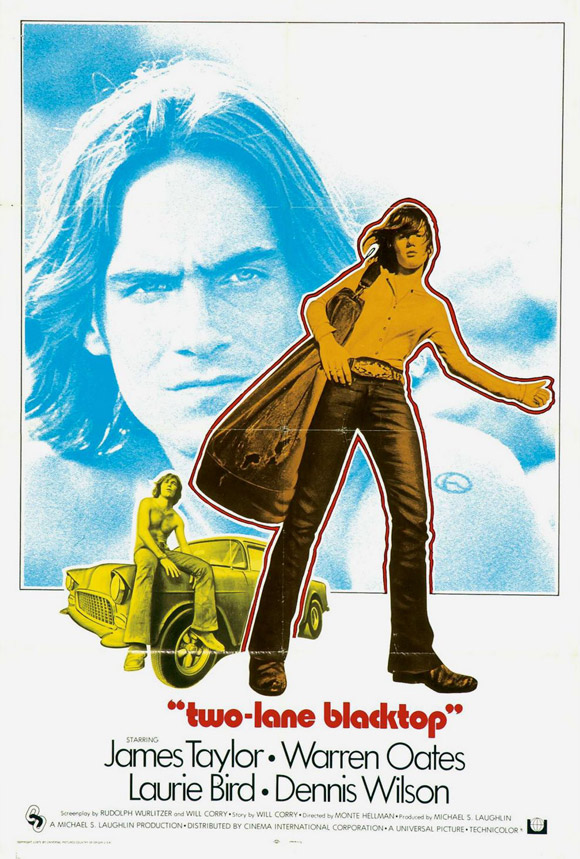
Directed by Monte Hellman, starring James Taylor and Dennis Wilson.
TWO-LANE BLACKTOP (1971)
Yup, that’s folk singer James Taylor and Beach Boys drummer Dennis Wilson. Easily the most minimalistic and restrained film on the list, cult classic Two-Lane Blacktop is above all a fascinating time capsule. Starring two musical legends and one of the era’s most tragic starlets, Laurie Bird, it’s a treat for all ‘70s nostalgists – the cars, Route 66 before the Interstate Highway system, all-denim outfits, careless hair.
Blacktop is an existential drama with a stark, hollow atmosphere and silences more often filled by motors than music. The boys drive around the country racing strangers in their ’55 Chevy, always physically in motion but emotionally inert, looking for something without knowing what. Though the film fails to achieve much characterization, it provides a stunning depiction of a quest for meaning that the youth of every generation understands all too well.
BADLANDS (1973)
Half a decade after Bonnie and Clyde shook up mainstream film, a similar runaway lovers-turned-serial killers story turned independent cinema on its feet, introducing a director that would become one of the most mysterious and influential in American history. Badlands is Malick’s most accessible film, propelled by an uncharacteristically wordy screenplay and stunning turns from the two leads. Holly, played by Sissy Spacek, is an especially unforgettable creation. The fifteen-year-old, charmed into tagging along on the killing spree, is completely oblivious to the gravity of the situation and is more concerned about her companion as a lover than a murderer. In her first screen role, Spacek, with her husky southern drawl, is perfect for Holly’s disarming earnestness.
Of course, it wouldn’t be a Malick movie without visual poetry: what Badlands does share with his more experimental works like The Tree of Life is cinematography to die for, always depicting America at just the right angle, with just the right sunlight. In other words, he shoots America the way we shoot our selfies.
[caption id="" align="alignnone" width="235"]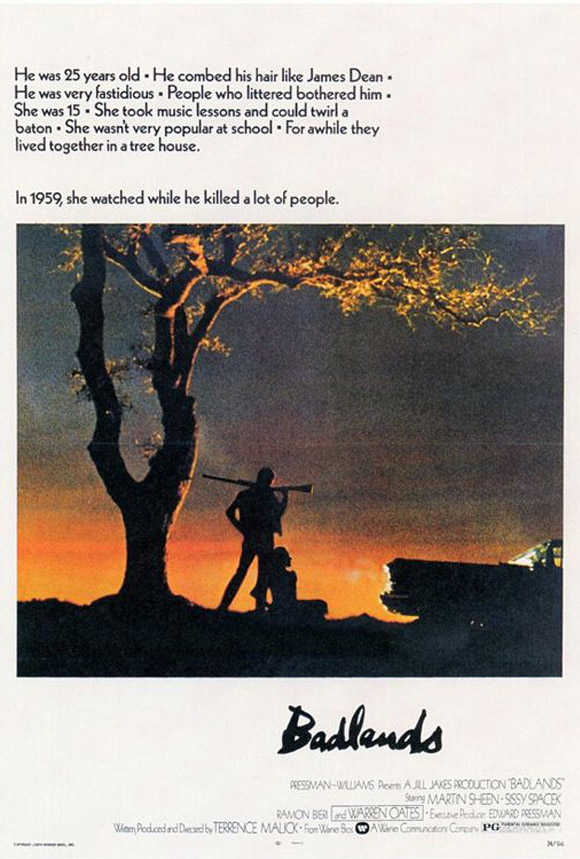 Directed by Terrence Malick, starring Martin Sheen and Sissy Spacek.
Directed by Terrence Malick, starring Martin Sheen and Sissy Spacek.
[caption id="" align="alignnone" width="235"]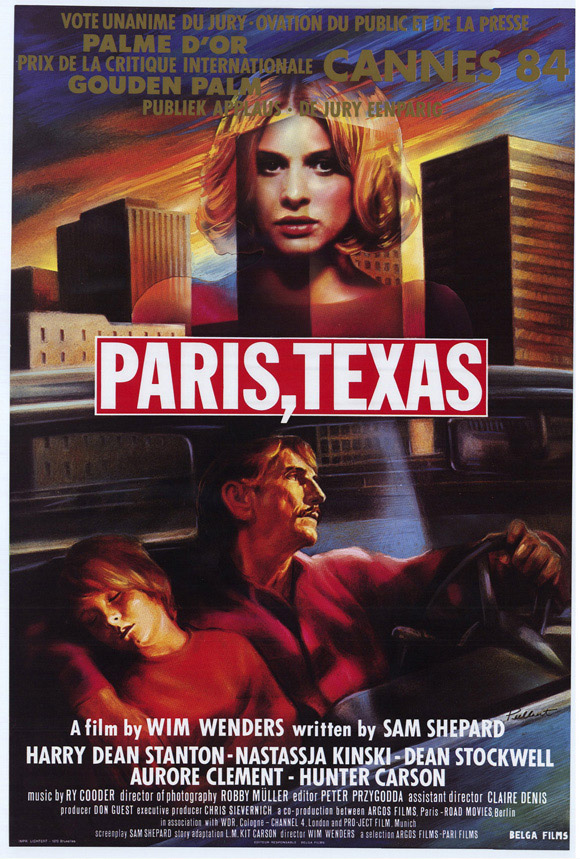 Directed by Wim Wenders, starring Harry Dean Stanton and Natassja Kinski.
Directed by Wim Wenders, starring Harry Dean Stanton and Natassja Kinski.
PARIS, TEXAS (1984)
If you watch only one road movie in your lifetime, better make it Paris, Texas. With a screenplay co-written by Americana icon Sam Shepard, a score by slide guitarist Ry Cooder, striking cinematography and career-best performances from all five cast members, it is one of those rare perfect films where every piece seems to have fallen right into place.
It tells the story of Travis, an amnesiac who after aimlessly wandering for four years feels compelled to rebuild his family, which was shattered by traumatic events. He gets in touch with his son, who does not remember him, before embarking on a quest to find Jane, wife and mother of the family.
Unanimous Palme d’Or winner at Cannes, it is a haunting, melancholic portrayal of a man desperately lost, both in his head and in the sprawling lands of Texas.
[caption id="" align="alignnone" width="235"]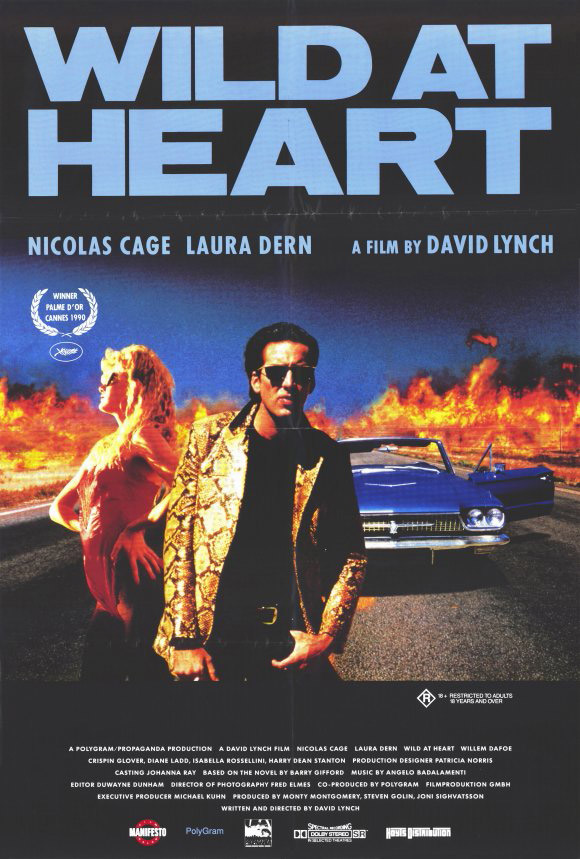 Directed by David Lynch, starring Nicolas Cage and Laura Dern.
Directed by David Lynch, starring Nicolas Cage and Laura Dern.
WILD AT HEART (1990), TRUE ROMANCE (1993), NATURAL BORN KILLERS (1994)
The early nineties brought back the outlaw couple theme, but this time it was nothing like the softly poetic Badlands. This time, it was loud, brash, bloody, colourful, satirical and hyper-referential. These three films all set out to create their own wacky universes with resounding success and individuality. Lynch’s Palme d’Or-winning Wild at Heart is the most cartoonesque of the three, backed by a killer soundtrack and a slew of actors who fully commit to their intentionally one-dimensional roles (though, let’s be real, Laura Dern and Willem Dafoe steal the show). It’s a big joke that strongly divided critics at the time of release, but Lynch is careful to depict the central relationship as honest and endearing enough to glue the pieces together.
Stone’s Natural Born Killers is at once the most ambitious and flawed of the trio. It’s a film about breaking rules, with characters engaging in bloody, sickening acts and a director throwing all conventions out the window. Shot with eighteen different filmmaking techniques (such as Super 8, 35mm colour, videotape and animation), the controversial movie aims to show not only grotesque criminality but, more importantly, mainstream media’s glorification of grotesque criminality. It’s a worthy – and perhaps only more relevant with time – goal, but Stone’s subjectivity and too-obvious intentions often get in the way.
True Romance has less lofty aims but is almost entirely void of faults. Its credentials speak for themselves: with a screenplay written by a Pulp Fiction-era Quentin Tarantino and a supporting cast including Dennis Hopper, Christopher Walken, Brad Pitt, Gary Oldman, Val Kilmer and the late James Gandolfini, the film had no option but to be the most fun of bloodsheds. Though it’s a hoot from start to finish, keep an eye on Walken and Hopper, who share a scene so mind-blowing it’ll give you a giddy schoolboy crush on cinema all over again.
[caption id="" align="alignnone" width="235"]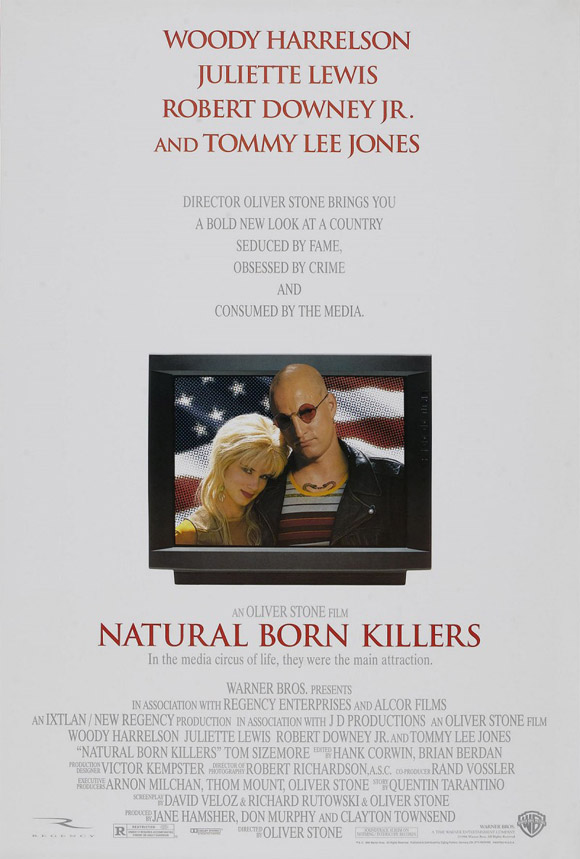 Directed by Oliver Stone, starring Woody Harrelson and Juliette Lewis.
Directed by Oliver Stone, starring Woody Harrelson and Juliette Lewis.
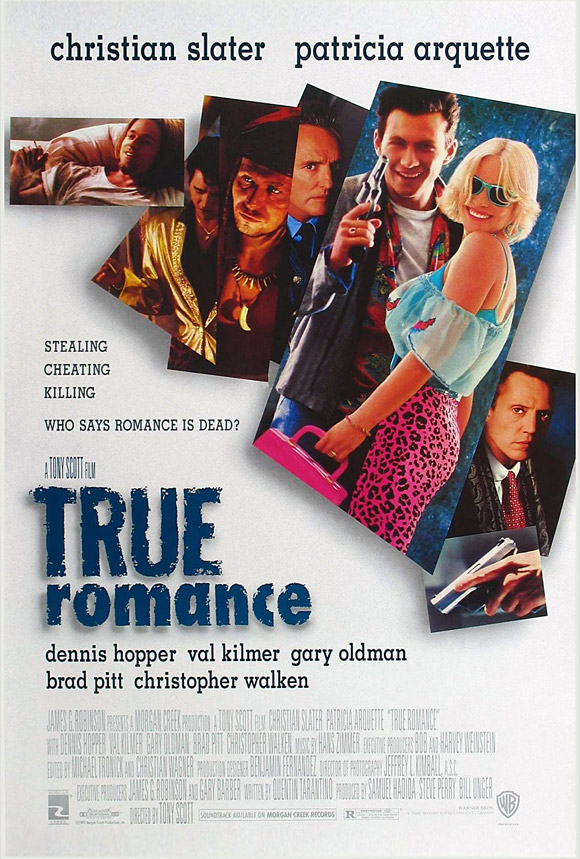
Directed by Tony Scott, starring Christian Slater and Patricia Arquette.
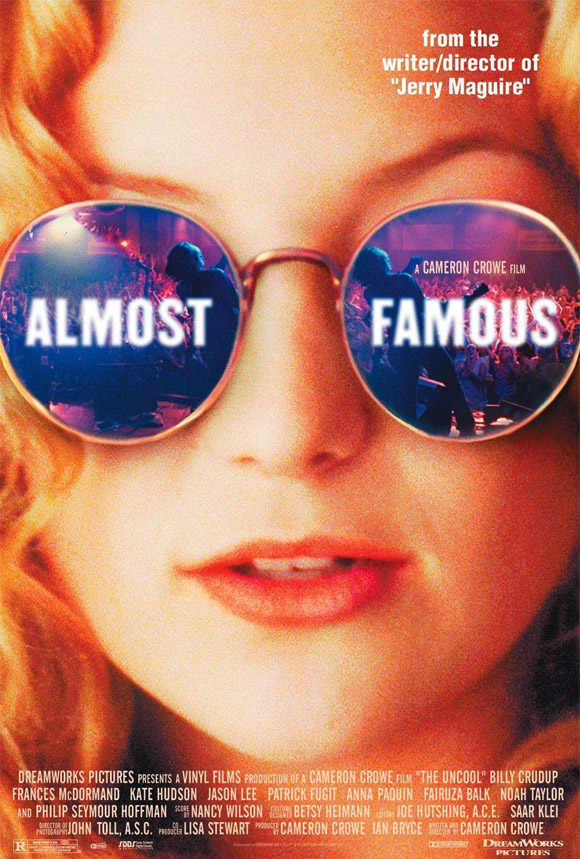
Directed by Cameron Crowe, starring Patrick Crudit and Kate Hudson.
ALMOST FAMOUS (2000)
Most of the films on this list have auteur directors with strong signatures; Crowe, on the other hand, has a light and near-anonymous touch. It makes his lesser films utterly forgettable, but his good ones – and Almost Famous is easily his masterpiece – timeless and completely uncontrived.
William is a teenage rock journalist who is assigned to accompany a band on tour for a Rolling Stone cover story. Crowe, having worked for the magazine himself, is completely at ease in the rock universe. Perhaps the movie’s most distinctive achievement is the way it makes a tragic figure out of the usually-thankless role of the groupie. Penny Lane (yup, really) is made unforgettable by her writer/director’s empathy and Kate Hudson’s Oscar-nominated screen debut – and only great performance to date.
Note: I challenge anyone to show me a better music-and-movies marriage than the “Tiny Dancer” scene.
A lot of my films start off with road maps instead of scripts.”
He was only describing his creative process, but with this sentence director Wim Wenders unknowingly put into words what every filmmaker who has attempted the road movie knows: places are stories. Words, reasons and logic are crucial to any film, but never are they more secondary than when one is willing to let places, and people between places, be their story.
Road movies – a genre featuring characters who spend most of the film’s duration travelling – have existed since the birth of film. However, no country has been nearly as fascinated with the road as the United States. And none have given it a comparable mystique in return.
From Bonnie and Clyde to Easy Rider to Thelma and Louise, the American landscape, perhaps due to its sheer grandeur and unpredictability, has symbolized time and time again freedom, promise, new beginnings and happier endings. It has molded some of cinema’s most memorable characters and made many-a-viewer dream of one day jumping in a ’66 blue Thunderbird and slamming the door on their past.
Few ever do, of course, but that’s beside the point. Highway 1 is the emergency exit you probably will never have to take – but it’s there if you need it. In honour of a genre that has provided the American Dream with a good chunk of its allure, here is a rundown of the best films that have been inspired by the road.

Directed by Monte Hellman, starring James Taylor and Dennis Wilson.
TWO-LANE BLACKTOP (1971)
Yup, that’s folk singer James Taylor and Beach Boys drummer Dennis Wilson. Easily the most minimalistic and restrained film on the list, cult classic Two-Lane Blacktop is above all a fascinating time capsule. Starring two musical legends and one of the era’s most tragic starlets, Laurie Bird, it’s a treat for all ‘70s nostalgists – the cars, Route 66 before the Interstate Highway system, all-denim outfits, careless hair.
Blacktop is an existential drama with a stark, hollow atmosphere and silences more often filled by motors than music. The boys drive around the country racing strangers in their ’55 Chevy, always physically in motion but emotionally inert, looking for something without knowing what. Though the film fails to achieve much characterization, it provides a stunning depiction of a quest for meaning that the youth of every generation understands all too well.
BADLANDS (1973)
Half a decade after Bonnie and Clyde shook up mainstream film, a similar runaway lovers-turned-serial killers story turned independent cinema on its feet, introducing a director that would become one of the most mysterious and influential in American history. Badlands is Malick’s most accessible film, propelled by an uncharacteristically wordy screenplay and stunning turns from the two leads. Holly, played by Sissy Spacek, is an especially unforgettable creation. The fifteen-year-old, charmed into tagging along on the killing spree, is completely oblivious to the gravity of the situation and is more concerned about her companion as a lover than a murderer. In her first screen role, Spacek, with her husky southern drawl, is perfect for Holly’s disarming earnestness.
Of course, it wouldn’t be a Malick movie without visual poetry: what Badlands does share with his more experimental works like The Tree of Life is cinematography to die for, always depicting America at just the right angle, with just the right sunlight. In other words, he shoots America the way we shoot our selfies.
[caption id="" align="alignnone" width="235"] Directed by Terrence Malick, starring Martin Sheen and Sissy Spacek.
Directed by Terrence Malick, starring Martin Sheen and Sissy Spacek.
[caption id="" align="alignnone" width="235"] Directed by Wim Wenders, starring Harry Dean Stanton and Natassja Kinski.
Directed by Wim Wenders, starring Harry Dean Stanton and Natassja Kinski.
PARIS, TEXAS (1984)
If you watch only one road movie in your lifetime, better make it Paris, Texas. With a screenplay co-written by Americana icon Sam Shepard, a score by slide guitarist Ry Cooder, striking cinematography and career-best performances from all five cast members, it is one of those rare perfect films where every piece seems to have fallen right into place.
It tells the story of Travis, an amnesiac who after aimlessly wandering for four years feels compelled to rebuild his family, which was shattered by traumatic events. He gets in touch with his son, who does not remember him, before embarking on a quest to find Jane, wife and mother of the family.
Unanimous Palme d’Or winner at Cannes, it is a haunting, melancholic portrayal of a man desperately lost, both in his head and in the sprawling lands of Texas.
[caption id="" align="alignnone" width="235"] Directed by David Lynch, starring Nicolas Cage and Laura Dern.
Directed by David Lynch, starring Nicolas Cage and Laura Dern.
WILD AT HEART (1990), TRUE ROMANCE (1993), NATURAL BORN KILLERS (1994)
The early nineties brought back the outlaw couple theme, but this time it was nothing like the softly poetic Badlands. This time, it was loud, brash, bloody, colourful, satirical and hyper-referential. These three films all set out to create their own wacky universes with resounding success and individuality. Lynch’s Palme d’Or-winning Wild at Heart is the most cartoonesque of the three, backed by a killer soundtrack and a slew of actors who fully commit to their intentionally one-dimensional roles (though, let’s be real, Laura Dern and Willem Dafoe steal the show). It’s a big joke that strongly divided critics at the time of release, but Lynch is careful to depict the central relationship as honest and endearing enough to glue the pieces together.
Stone’s Natural Born Killers is at once the most ambitious and flawed of the trio. It’s a film about breaking rules, with characters engaging in bloody, sickening acts and a director throwing all conventions out the window. Shot with eighteen different filmmaking techniques (such as Super 8, 35mm colour, videotape and animation), the controversial movie aims to show not only grotesque criminality but, more importantly, mainstream media’s glorification of grotesque criminality. It’s a worthy – and perhaps only more relevant with time – goal, but Stone’s subjectivity and too-obvious intentions often get in the way.
True Romance has less lofty aims but is almost entirely void of faults. Its credentials speak for themselves: with a screenplay written by a Pulp Fiction-era Quentin Tarantino and a supporting cast including Dennis Hopper, Christopher Walken, Brad Pitt, Gary Oldman, Val Kilmer and the late James Gandolfini, the film had no option but to be the most fun of bloodsheds. Though it’s a hoot from start to finish, keep an eye on Walken and Hopper, who share a scene so mind-blowing it’ll give you a giddy schoolboy crush on cinema all over again.
[caption id="" align="alignnone" width="235"] Directed by Oliver Stone, starring Woody Harrelson and Juliette Lewis.
Directed by Oliver Stone, starring Woody Harrelson and Juliette Lewis.

Directed by Tony Scott, starring Christian Slater and Patricia Arquette.

Directed by Cameron Crowe, starring Patrick Crudit and Kate Hudson.
ALMOST FAMOUS (2000)
Most of the films on this list have auteur directors with strong signatures; Crowe, on the other hand, has a light and near-anonymous touch. It makes his lesser films utterly forgettable, but his good ones – and Almost Famous is easily his masterpiece – timeless and completely uncontrived.
William is a teenage rock journalist who is assigned to accompany a band on tour for a Rolling Stone cover story. Crowe, having worked for the magazine himself, is completely at ease in the rock universe. Perhaps the movie’s most distinctive achievement is the way it makes a tragic figure out of the usually-thankless role of the groupie. Penny Lane (yup, really) is made unforgettable by her writer/director’s empathy and Kate Hudson’s Oscar-nominated screen debut – and only great performance to date.
Note: I challenge anyone to show me a better music-and-movies marriage than the “Tiny Dancer” scene.
